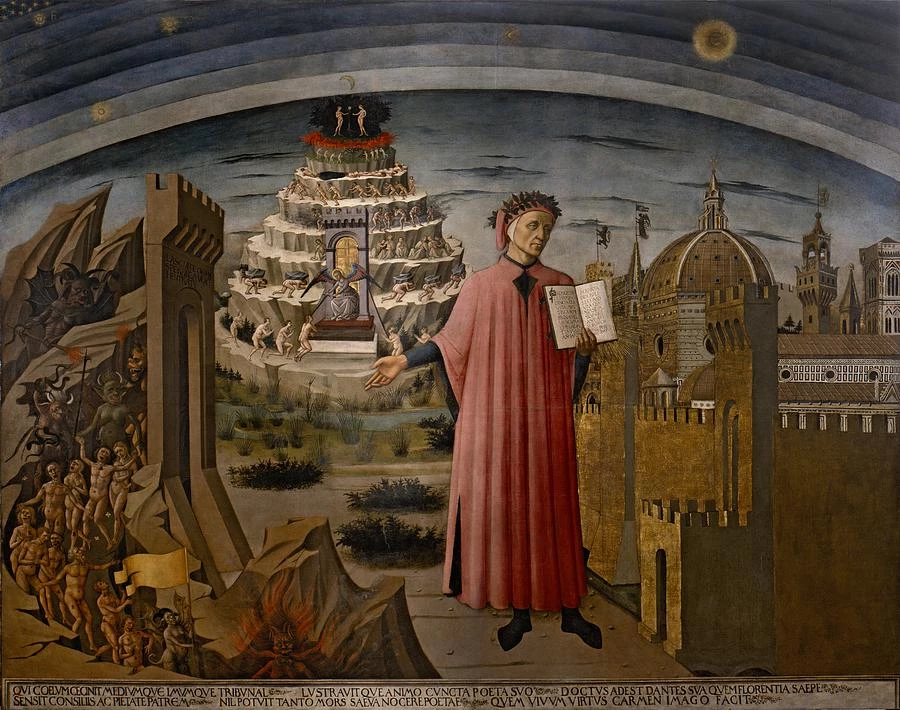When Theodicies Go Wrong

An Overdue Disavowal
La commedia illumina Firenze (1456), Domenico di Michelino
The all too common theodicy–of which I’m sure you’ve been either the unfortunate recipient or, as I (not long enough ago) was, the unwelcomed benefactor–that cites incompatibility between, on the one hand, the unbeliever’s potential discomfort in the presence of God and, on the other, Heaven’s perfection as the reason for Hell is offering (1) a gross perversion of Gospel theology; (2) a display of willful ignorance concerning the nature of God, man, or both; and (3) a slap in the face of skeptics everywhere.
The argument runs as follows: God would love to let everyone into Heaven, but, alas, the anti-theists have established in their short time on earth that they don’t much care for the whole “God” thing. Consequently, with God being too loving to subject someone to His eternal presence and Heaven being without pain and all, the non-Christian is instead given what he “really wants” (that is, unfathomably horrific torture and torment in a lake of burning sulfur for all of eternity).
(1) On the first count, imagine for a moment the absolute outrage that the Gospel authors would undoubtedly feel at the sight of their words being so blatantly misconstrued, if for no other reason than, to substitute, or at the very least supplement, the skeptic’s unrepentance with his future unhappiness as the obstacle barring his entry into heaven. And the abuse of scripture is not offset, but only further aggravated, with the trite appeals to God’s love that invariably follow in defense of this silly argument. When, I ask, was the Warrior King of Revelations 19 replaced with Jesus meek and mild, and on whose authority was such a bastardization of the holy text allowed? Besides, (in case the irony was lost on you the first time around) if God really was principally concerned with the unbeliever’s discomfort, am I to believe He could do no better than Hell by way of alternate housing? No, I’m sorry, but the reason why Hell exists is that the consequence of sin is death and, when left unrepented (i.e., unatoned by Jesus), death of the sort described in Matthew 13:42.
(2) Concerning the nature of God and man, the apologists for this disgraceful theodicy err in at least two important ways. First, in an attempt to accomplish the exact opposite, they construct an unjust, unloving God. Make no mistake: what the proponents of this argument are really saying is that, provided the unbeliever were to change his attitude toward Him upon their meeting, God would grant him admission into the Kingdom despite his unresolved sins and, save for the culminating moment in which he has a divine gun to his head, uncontrite heart. How is this just or loving to those afflicted by the aforementioned sins? This then brings me to my second point concerning the nature of man, which has been conveniently ignored hitherto. There is, I suspect, absolutely no person, past, present, or future, who, afforded half a nanosecond with the creator of the universe, wouldn’t fall on their knees in absolute terror and adoration. Even the most ardent of anti-theists (think Stephen Fry) would be overjoyed to spend eternity in Heaven, and anyone who claims otherwise holds a woefully shallow view of God’s magnificence, a drastically inflated view of man’s pride, or both.
(3) Finally, how low must one regard his fellow man, the sincere skeptic, to assume that he is so committed to a prideful (or otherwise hedonistic) life, and, consequently, so opposed to any moralizing/subjugating truth, that he would rather suffer for all of time in a pit of misery and despair than acquiesce to an indubitably higher authority, by whom, I might add, the rather tempting prospect of eternal bliss is readily offered on condition that you simply respond to His love in kind–something theoretically impossible not to do when exposed to His full majesty anyway? The answer is, “very low, indeed”. So low, in fact, that I dare not associate with any such Christian for fear that their self-righteous condemnation fall, first, on my unbelieving friends and, second, on me.
In conclusion, I apologize to the skeptics who have endured this debasing theodicy in the past, and I urge the Christian community, namely the apologists among us, to dispense with such facile lines of argumentation; we would be doing everyone, the unsaved, the Church, and God Himself, a grave disservice if we don’t.
Dedication:
To Christopher Hitchens, the man who taught us that there is, in fact, no light without heat.



Leave a Reply